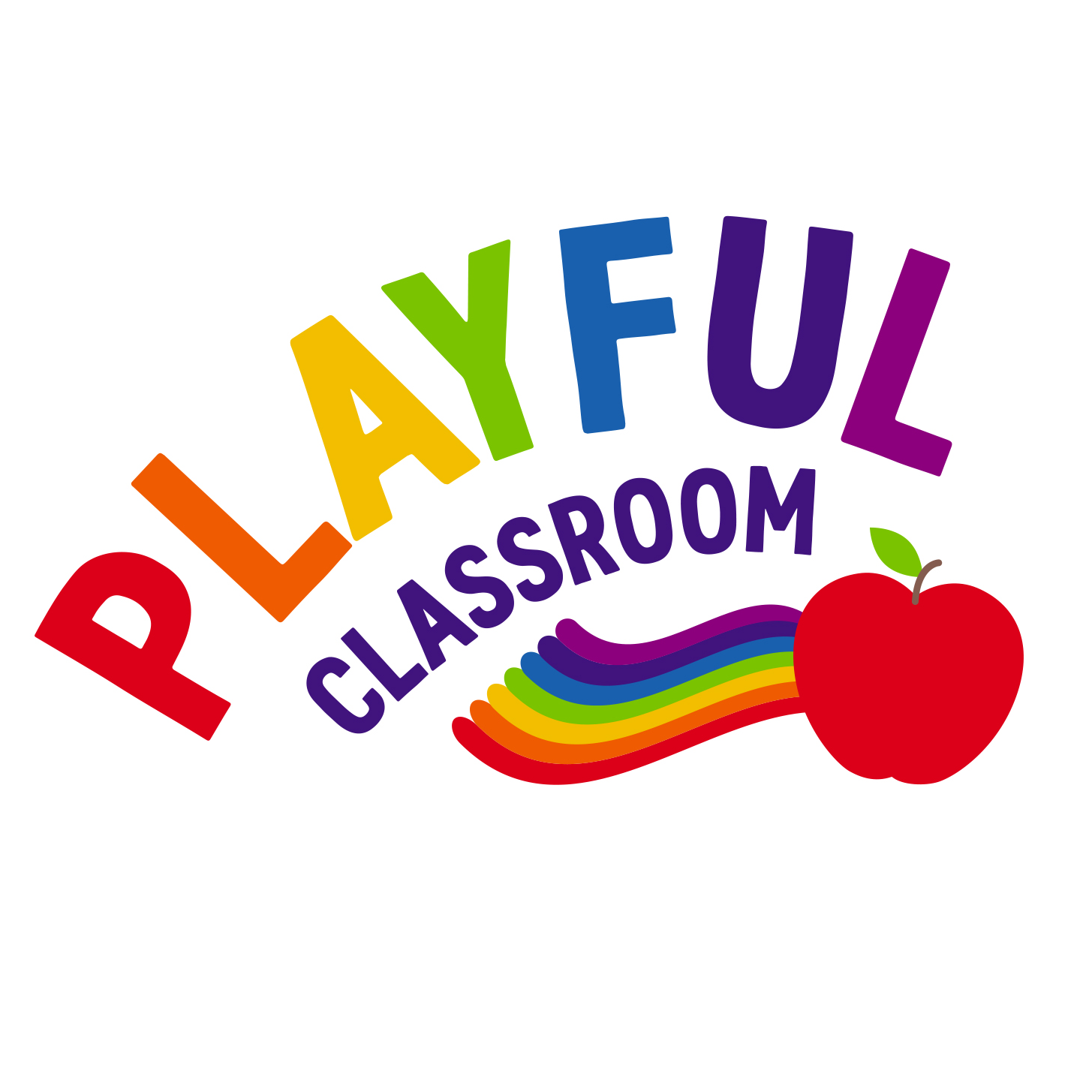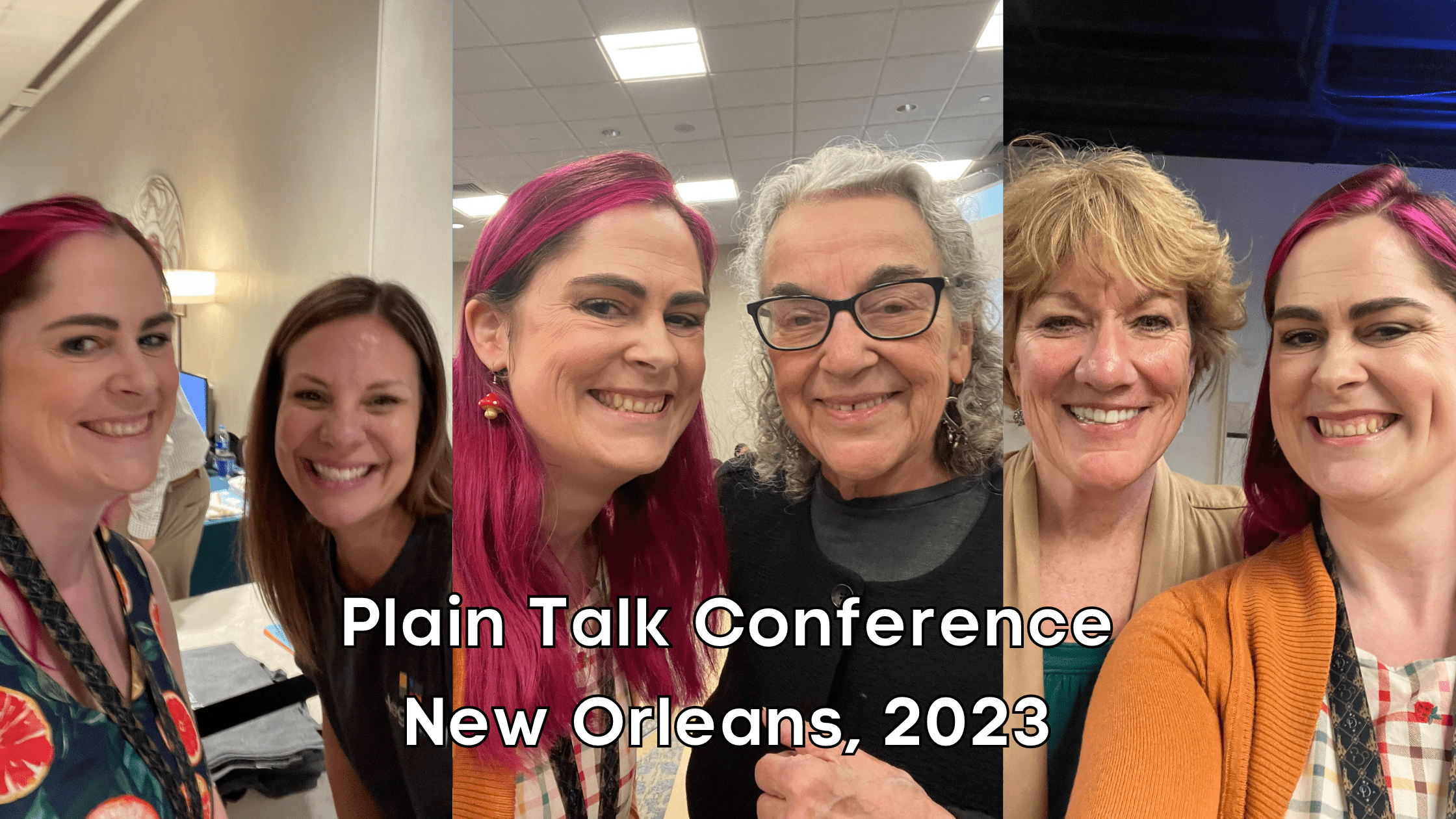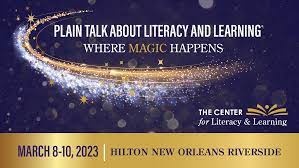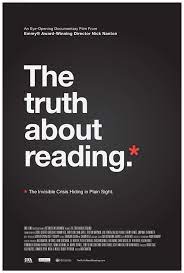Plain Talk Conference Review 2023
Plain Talk about Literacy and Learning
8 – 10 March 2023
New Orleans, Louisiana
Plain Talk was my first conference in the United States. I thought it might be useful to share my experiences and takeaways for anyone who is thinking about taking the plunge themselves. I had previously been to several conferences in Ireland, which were all on a smaller scale. American conferences are in a different league altogether! I was the only person who travelled from Ireland to the conference; we’ll come back to that later!
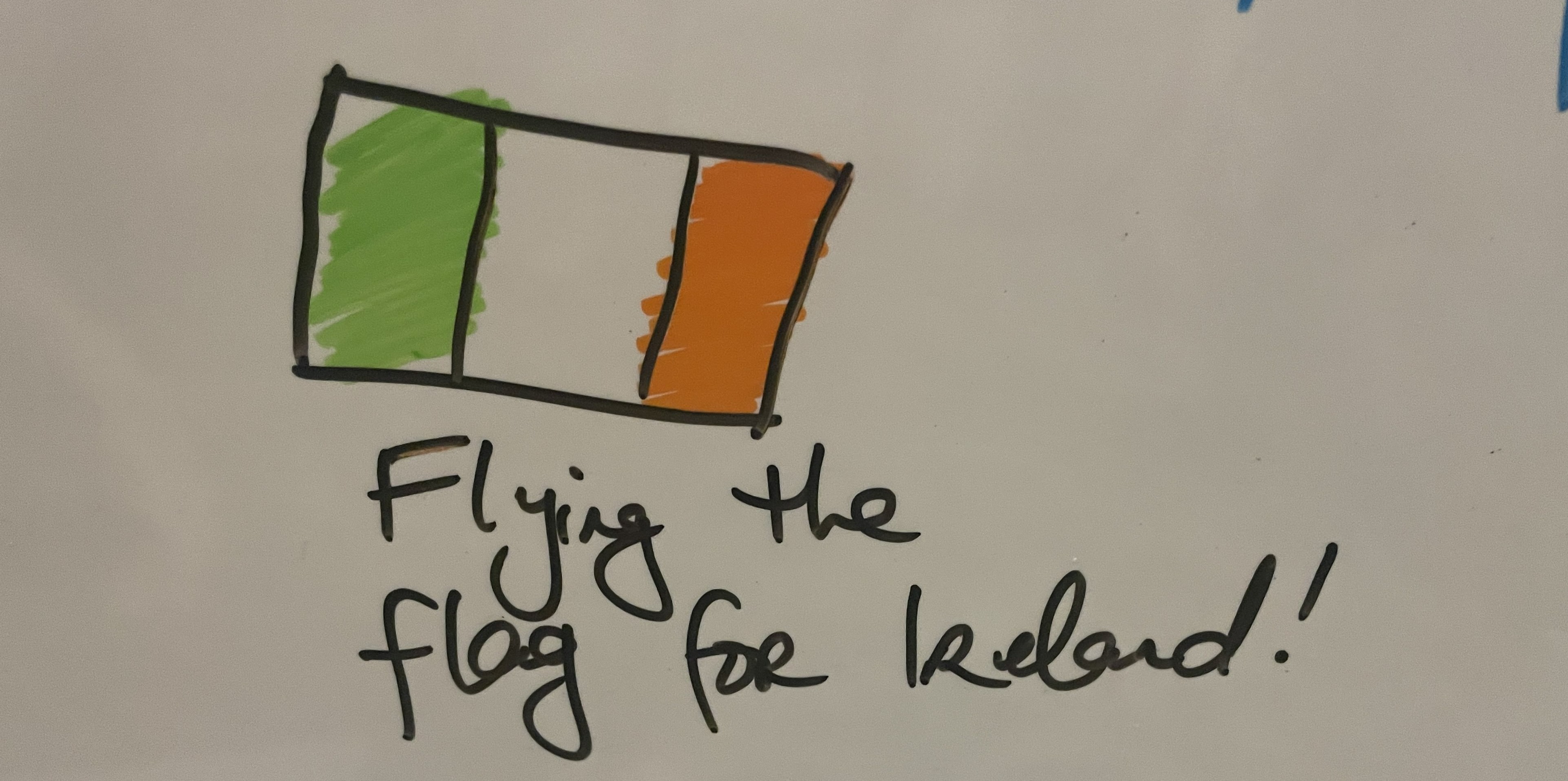
I booked Loews Hotel, which was one of the recommended hotels, to avail of the group rate, which was reasonable value for the city. The hotel was in a great location, very close to the venue, and walking distance to the French Quarter. I couldn’t fault it.
The evening before the conference, I went to the venue for early registration and to make sure I knew where I was going the following morning. I registered and picked up my name tag and tote bag. It was extremely busy, and I was a little overwhelmed at how many people were there. 2,500 attendees is quite a lot! I was nervous, being on my own, but those worries were quickly abated once it began the next morning. After travelling so far, I wanted to make the most of the experience, and I sat up front for all of the talks I attended and spoke to as many presenters and exhibitors as I could.
There was a keynote speaker every day, followed by breakout sessions where attendees could choose from up to ten different speakers. The biggest problem I faced during the conference was choosing who to see every day! The calibre of speakers involved was extremely high; there were too many fantastic names to choose from! While I was happy with my decisions, I still felt FOMO about the speakers I didn’t see. You can find the conference programme here.
The conference was very well run, by both the organisers and the venue. There was plenty of seating in each room, and a good 20 minute break in between each talk to allow for movement, toilet breaks etc. Breakfast and lunch were provided, buffet style, for the first two days, and a jazz brunch on the third day. Drinks and snacks were also offered in the afternoons. Everything that was served was excellent; a great selection of Louisiana-style food.
Day 1
Keynote: Hamish Brewer, AKA The Skateboarding Principal
Hamish was an excellent choice to open the conference. The energy in the room was palpable, and everyone left ready to open their minds to new learning over the next three days. Hamish is a Principal in a disadvantaged middle school. His attitude to leadership is unconventional, but it works. He has turned his school around, increasing scores and building a positive community atmosphere.
One quote from Hamish really stood out for me:
“Poverty is not a learning disability.”
Whether we know it or not, this is relevant to all of us educators. We cannot dismiss a child’s potential because of their background. I have been guilty of this in the past, but I will be heed Hamish’s words from now on.
Links:
Kareem Weaver – The Expectation Gap
I had recently seen Kareem feature in the documentary, ‘The Right to Read’, so I was delighted to see his name on the schedule. Kareem’s presentation followed on nicely from the keynote, addressing the difference between achievement gaps and expectation gaps. Our expectations have a huge impact on children with difficulties. He spoke of the ‘soft bigotry of low expectations’, and the need to hold all children to rigorous standards. According to a meta-analysis of studies of the influences on student achievement, collective teacher efficacy had the best outcomes. (Hattie, 2015)
Links:
Dr. Anita Archer – Reading Interventions for Upper Grades
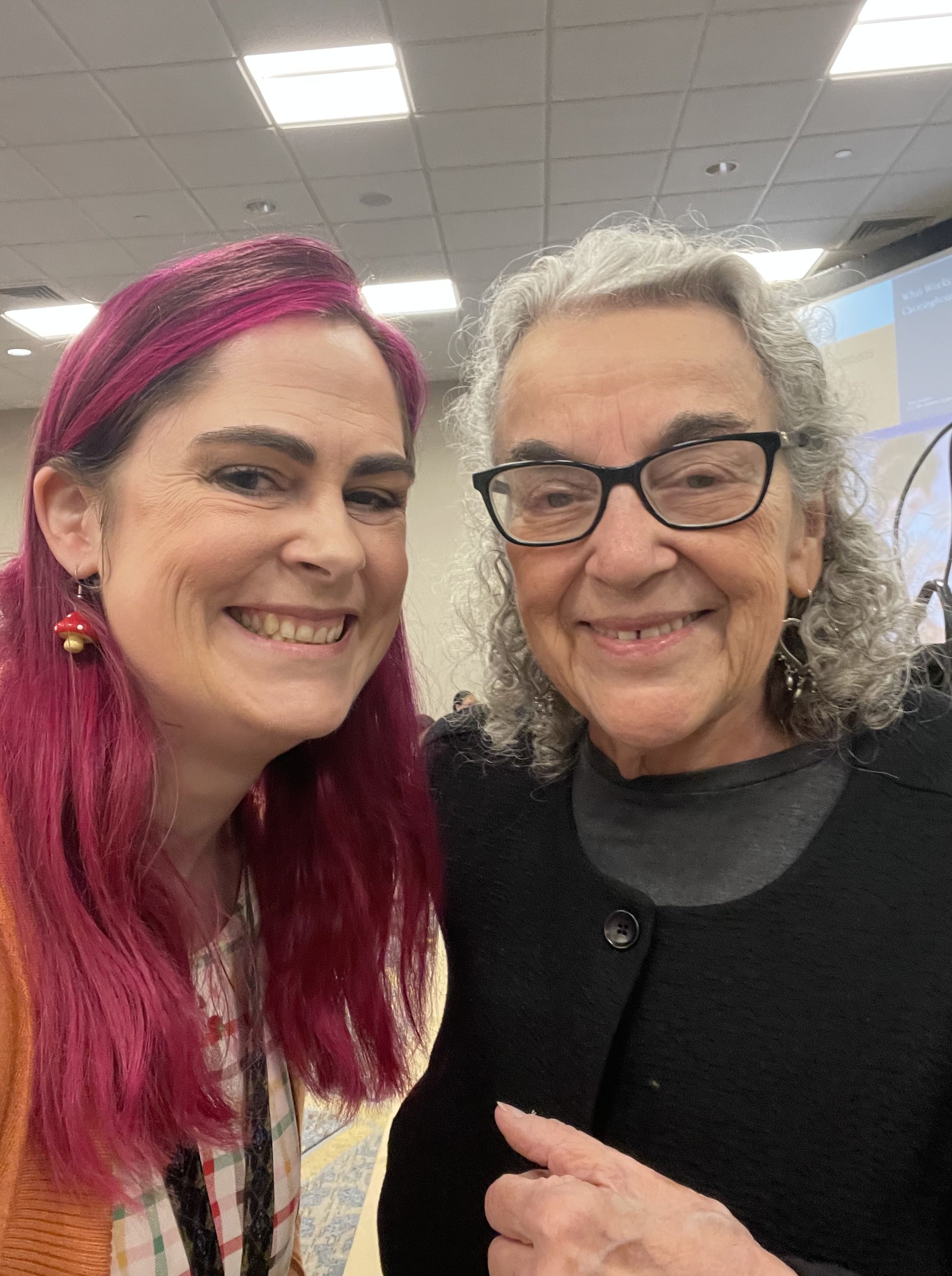
My interests mainly lie in early literacy, however I knew that I would be happy to listen to anything that Dr. Archer had to say! I wasn’t wrong, as the content of her presentation was applicable to readers of from 1st Class upwards. Dr. Archer is most well-known for her direct and explicit approach to instruction. Her ‘Archerisms’ are famous throughout the teaching community. She signed her book ‘Explicit Instruction’ for me and she was lovely to talk to. However, I would also like to note that she made me stand up in front of the crowd of approximately 500 attendees as she announced that I was the only one who had travelled from Ireland to the conference, and made them all give me a “wooo”! For the rest of the conference, people shouted ‘Hey, Ireland!’ at me whenever they saw me. I was like a mini celebrity!
Based on the recently published Institute of Educational Sciences Practice Guide, Dr. Archer made four instructional recommendations for older struggling readers:
1. Decoding multisyllabic words
Many children cannot transfer the skill of decoding single syllable words to multisyllabic words. A common habit I have seen in children is to decode the first syllable and then guess the rest of the words based on the context. Obviously, this is inefficient. 80% of multisyllabic words have prefixes and suffixes. Learning about affixes and how to spell and pronounce them is highly beneficial for ALL students. It is also important not to wait too long to introduce multisyllabic words. Use the knowledge the children have, for example, the words ‘rabbit’ and ‘rocket’ are easily decoded once the syllables are divided.
2. Fluency-building activities
Reading fluency consists of ease, expression, and appropriate pacing. Fluency cannot happen before decoding has been mastered. Accuracy and automaticity must come before prosody. Use a wide variety of text types, topics, sentence structures and writing styles.
3. Comprehension-building practices
In order to have reading comprehension, a child must be able to read the words, know the vocabulary, and have background knowledge of the topic. There’s more involved than just teaching comprehension strategies. Dr. Archer noted that non-fiction texts are particularly useful in intervention as they give the children the chance to build vocabulary and background knowledge.
4. Opportunities to read challenging texts and be exposed to complex ideas and information
Following on from the comprehension work, Dr. Archer stressed the importance of giving children opportunities to read challenging texts. If they are limited to reading texts at their ‘just-right level’, they are not getting opportunities to access complex ideas and information. This, in turn, is limiting their chances of reaching their true potential. This echoed Kareem Weaver’s talk about social justice and expectations. If our disadvantaged students are further deprived at school, we are not treating them equitably.
Links:
· ‘The Science of Instruction’ Webinar
· Best Practice Guide – Reading Interventions Grades 4-9
Nora Chahbazi – Three Approaches to Foundational Literacy Instruction
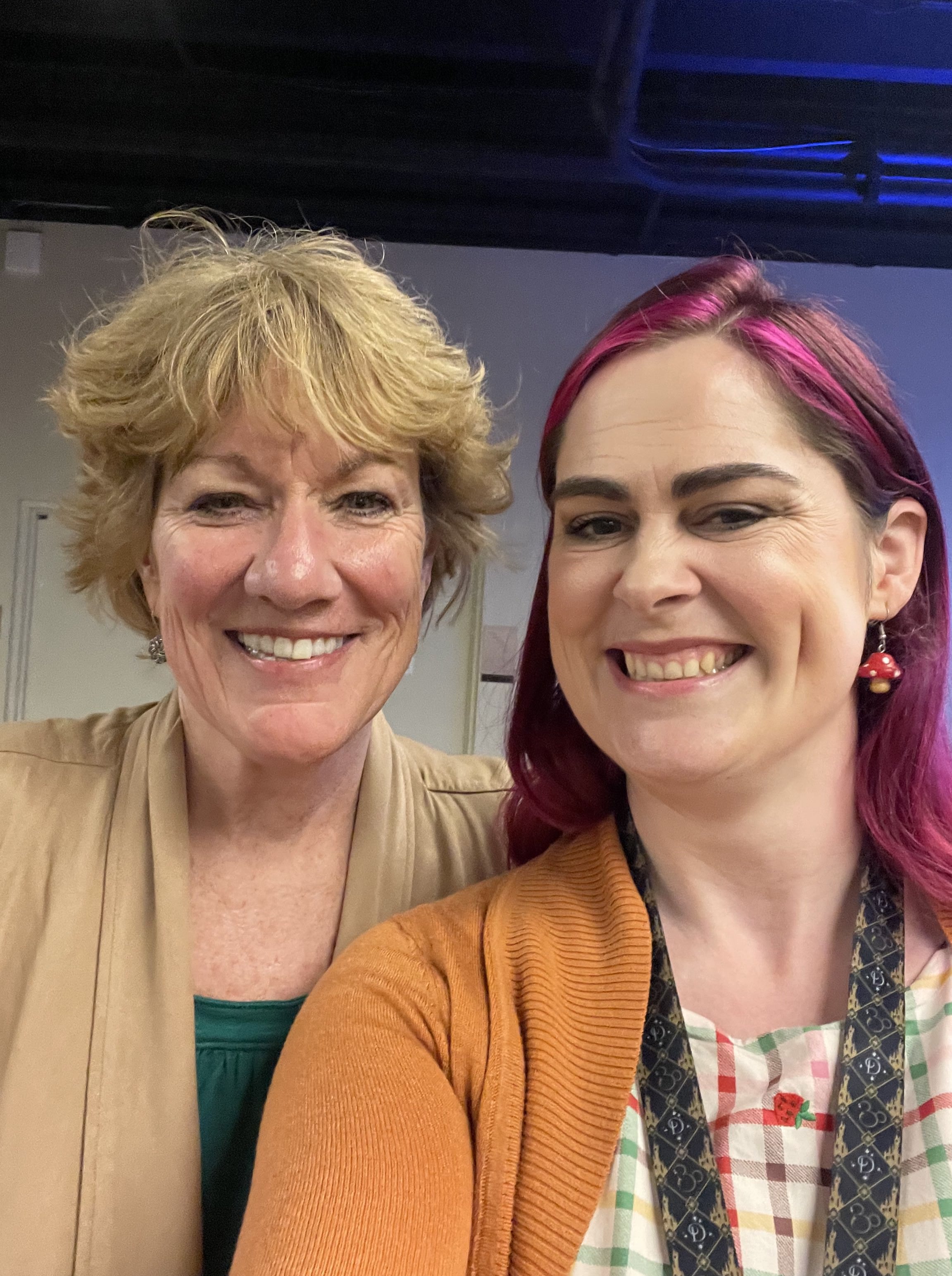
Nora Chahbazi is the founder of EBLI, Evidence-Based Literacy Instruction. She trains teachers in Structured Linguistic Phonics, an effective ‘speech-to-print’ approach to reading instruction. Nora was involved in the documentary, ‘The Truth About Reading’. More about that later.
Nora’s presentation compared three approaches to reading instruction: Balanced Literacy, Traditional Phonics, and Structured Linguistic Literacy. In SLL, speech and sounds take the lead, rather than words or letters. If you are interested in SLL, take a look at the Facebook group, ‘Linguistic Phonics Exploration’, or the book, ‘Make it Stick’.
Nora is of Irish descent, and was a pleasure to talk to. She is a very special lady. I told her that I was moved to tears while watching one of her videos in which she taught a grown adult to read. You can find the link below. The story is also featured in The Truth About Reading documentary, which I got to watch at the conference too.
Links:
· EBLI
· Interview with David Chalk, who learned to read at the age of 62
· The Truth About Reading Documentary
Lyn Stone – Making Words Stick
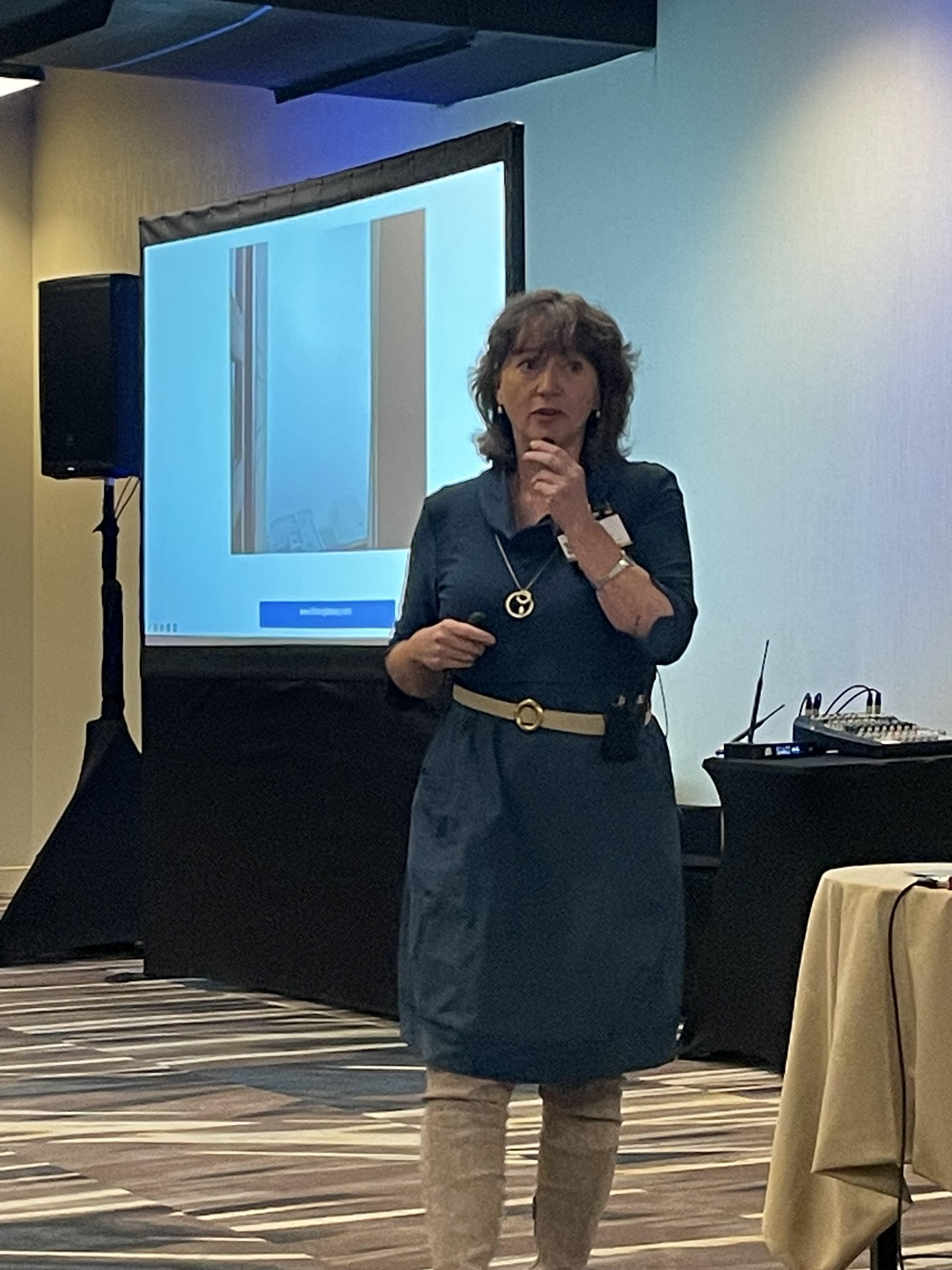
Lyn Stone is a Scot, living in Australia. She is a linguist with a special interest in spelling and helping children master the English language. Lyn is brilliant. If you ever get a chance to see her speak, don’t miss it! Not only is she spot on with her content, she delivers it with skill and humour.
Spelling error analysis can tell you a lot about a child. Lyn recommended the Spalding Spelling Scale for assessment, which includes several standardised spelling tests. Spelling is not just a visual memory skill, nor is it just reading in reverse. Good spelling instruction includes orthography, morphology, and etymology. Looking at the structure of words will help children to read, write and understand words with accuracy and automaticity.
Lyn’s 4 Steps to making words stick:
1. Define the target word in child-friendly language.
2. Inspect the structure of the word. Syllables/morphemes/letter sequences/letter sounds.
3. Who is in its family? Words that are similar based on meaning, morphemes or spelling.
4. Practice. Say and write the word. Revisit over time.
Links:
Spalding Barson Spelling Scale
Day 2
Keynote: Zaretta Hammond, Literacy for a Diverse Society
I was unfamiliar with Zaretta Hammond, but I was in the minority, as everyone else seemed to know who she was! She is the author of the book ‘Culturally Responsive Teaching and the Brain’.
Zaretta spoke about equity in reading development. While we have come a long way since the American anti-literacy laws of 200 years ago, we are not quite there yet. People of colour are still more likely to be among the lowest performers at school. She spoke about the ‘Iceberg Problem’, where learning gaps accumulate over time, often unseen.
A quote that stayed with me was, “Same old thinking is gonna get you the same old results.”
Links:
Culturally Responsive Teaching
Lyn Stone – What if I told you there was no complex code?
How lucky was I, to get to see Lyn Stone not once, but twice in two days?!
In this session, Lyn talked about the myth of English being a ‘complex code’. She believes it to be a simple code, with morphemic and etymological layers, and operational rules. She stressed that we don’t need to get caught up with teaching 150 or 200 phonograms or graphemes, instead we should focus on 60 or so major consonant units and vowel patterns, and put the rest of our efforts into spelling rules, morphology and etymology.
Lyn also spoke about phoneme-grapheme mapping. While this is an important activity for beginning readers, and worthy of our time, it does not need much emphasis when children have moved on to multisyllabic words. And speaking of syllables, Lyn also advised against a dependence on syllable types, as they do not match up with the morphemes or orthography of a word.
Lyn recommended several resources, which I will link below.
Links:
Wiley Blevins – Choosing and Using Decodable Texts
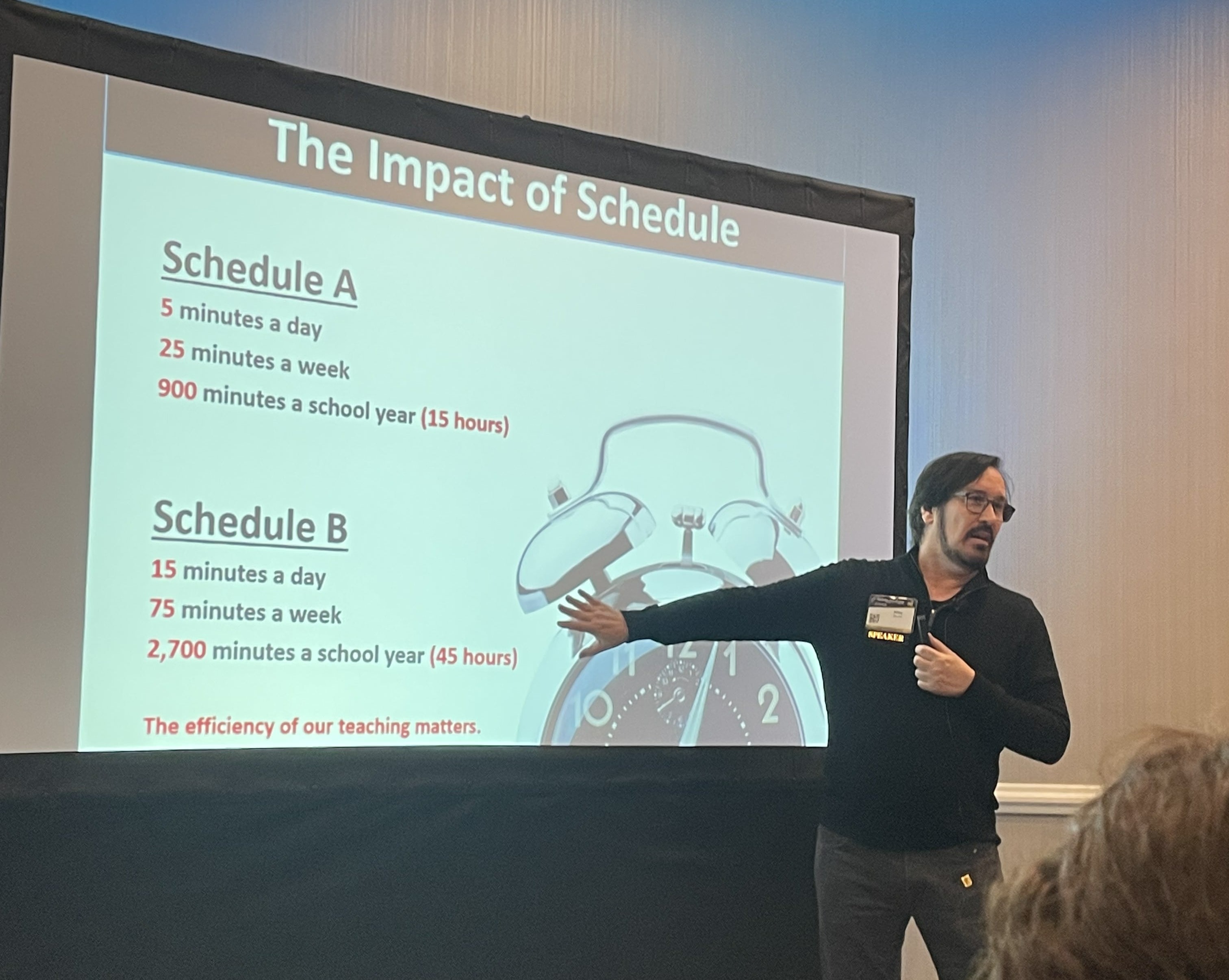
I own several books by Wiley Blevins, and I forgot to bring any of them for him to sign. Raging.
Wiley is the king of phonics. This session focused on the application of phonics skills to reading and writing, as this is where phonics instruction often fails. Personally speaking, it’s where I have fallen down myself in the past.
“It’s in the application that the learning sticks.”
Wiley asserts that half of a phonics lesson should be spent on reading and writing. Decodable readers are one way to achieve this. Decodables are not forever; they are only suitable for a limited period of time, but they are important for beginning readers. The use of trade books (authentic children’s literature) should be gradually increased while the use of decodable books is decreased. He advises against the use of levelled books.
While not their main goal, Wiley also explored the use of decodable readers for building vocabulary, comprehension, syntax and writing. Follow-up work in writing can strengthen targeted phonics skills.
Most of all, Wiley emphasised the importance of systematic, cumulative learning. We must avoid decayed learning!
Links:
Meeting the Challenges of Early Phonics Instruction (Article)
Choosing and Using Decodable Texts (Book)
Choosing and Using Decodable Texts (Webinar)
Denise Eide – How to Eliminate Three-cueing and Sight Words
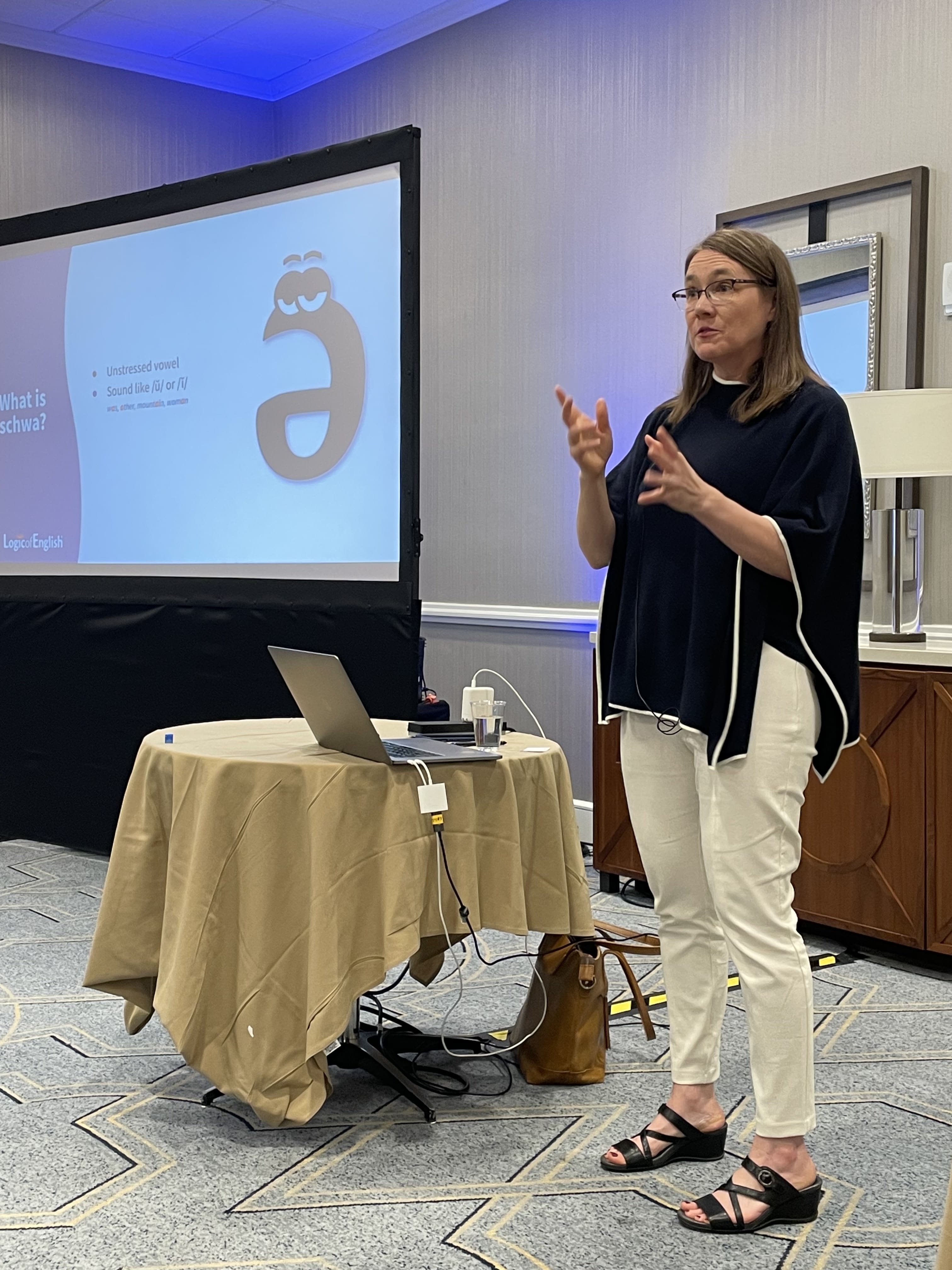
Denise is the author of ‘Uncovering the Logic of English’, an award-winning book that, in my opinion, belongs on the shelf of every teacher. Denise’s talk echoed that of Lyn Stone, in that the English language is not too ‘complex’ to master. Denise advocates for the teaching of phonics and spelling rules to children so as to give them the best chance to become skilled readers and writers.
Denise explained several simple rules that if taught early, can make reading and writing easier to grasp. Rules such as the letter ‘s’ spelling the /z/ sound, or the letter ‘c’ spelling the /s/ sound, can unlock hundreds of ‘irregular’ words. She recommends explicitly teaching the most frequently used, basic phonograms or graphemes that occur in the dolch and fry high-frequency word lists to mastery.
There are lots of free resources available on the Logic of English website, including a chart of the 75 Basic Phonograms. See the links below.
Links:
Uncovering the Logic of English (book)
Logic of English – free resources
The Truth About Reading – Documentary
Day Two concluded with a screening of the documentary ‘The Truth About Reading’. I had heard about this documentary about a year ago but didn’t know if I would ever get to see it, so I was really grateful for the opportunity. It didn’t disappoint. The tagline is ‘The Invisible Crisis Hiding in Plain Sight’, which is particularly apt. Access to literacy skills is inequitable, and the documentary demonstrated that in a poignant way.
One of the people involved in the documentary was John Corcoran, a former high school teacher, who could not read until the age of 48. He set up a foundation to help to prevent illiteracy. You couldn’t help but be touched by his story.
The people involved in this documentary may have been American, but the issues raised are pertinent across the globe.
Links:
The Truth About Reading (website)
The Truth About Reading (trailer)
Day 3
Keynote: Malcolm Mitchell, Share the Magic Foundation
Another name I was not familiar with, but everyone else seemed to know him! Malcolm was an American footballer who progressed through school and college on his sporting abilities rather than academic. He joined a book club and improved his reading skills by himself. Now, he is an advocate for children’s literacy.
Links:
Deb Glaser – Morphemes for Grades K-3
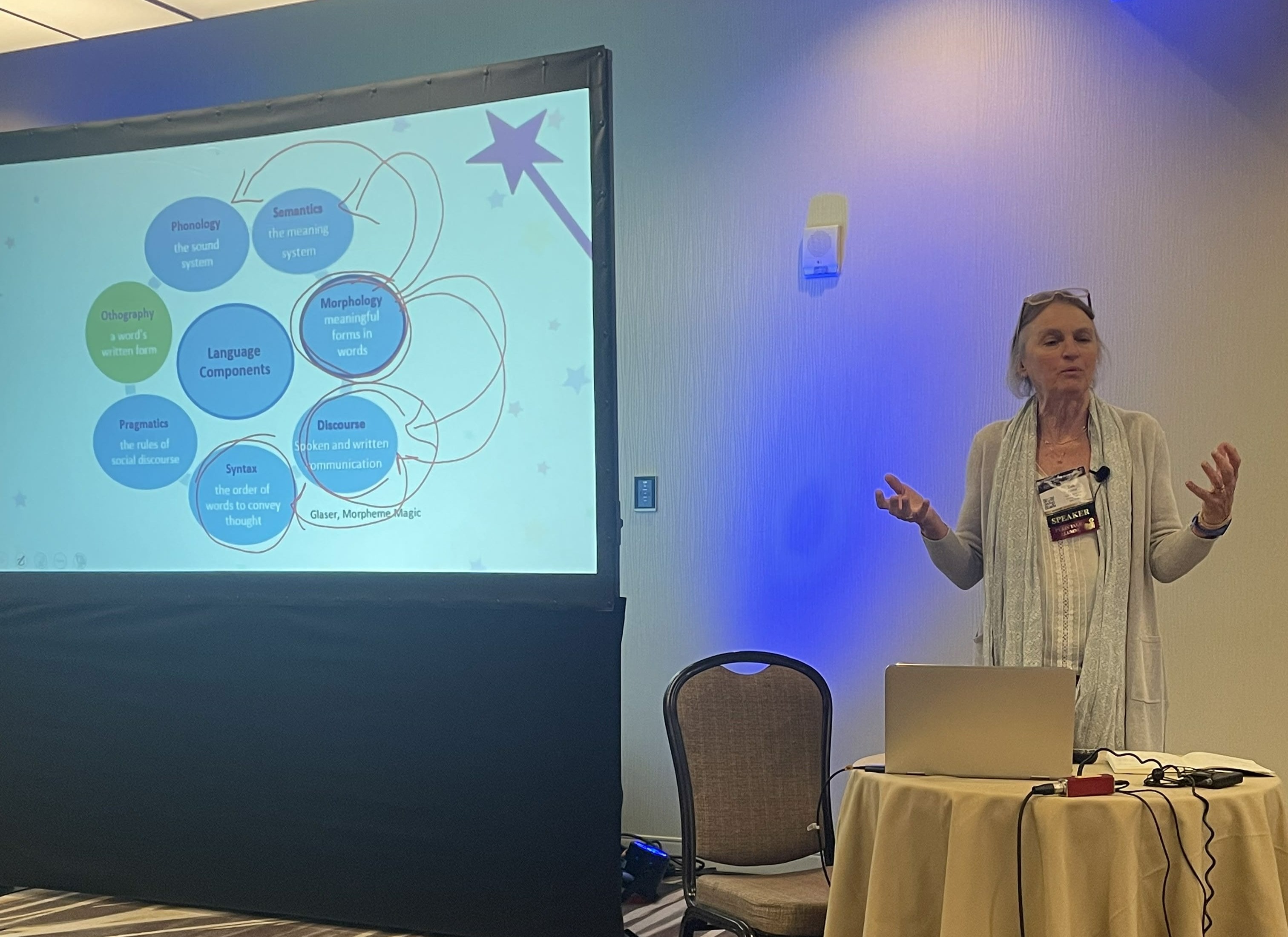
Fellow shopaholics will understand the frustration of wanting to buy something online only to find the logistics of having a package delivered to Ireland ridiculously complicated. I took the opportunity of being in the US and got some books delivered to my hotel. One of those was Deb Glaser’s new book, ‘Morphemes for Little Ones’.
Deb is synonymous with morphology instruction. She spoke of the usefulness of morphological awareness for children. According to the International Dyslexia Association, Structured Literacy instruction is not just about phonics; morphology is an integral part.
I am very interested in morphology, but Deb gave me new perspective on it. Morphological Awareness brings meaning to words. This is as much an important part of language comprehension as it is of reading. Precision in phonology and orthography are important, but connecting these to meaning can deepens vocabulary knowledge.
Deb was delightful to talk to; a very kind person
Links:
Morphemes for Little Ones (book)
Morphemes are Mesmerizing! (Webinar)
David Kilpatrick – Understanding and Addressing Word-Level Reading Problems
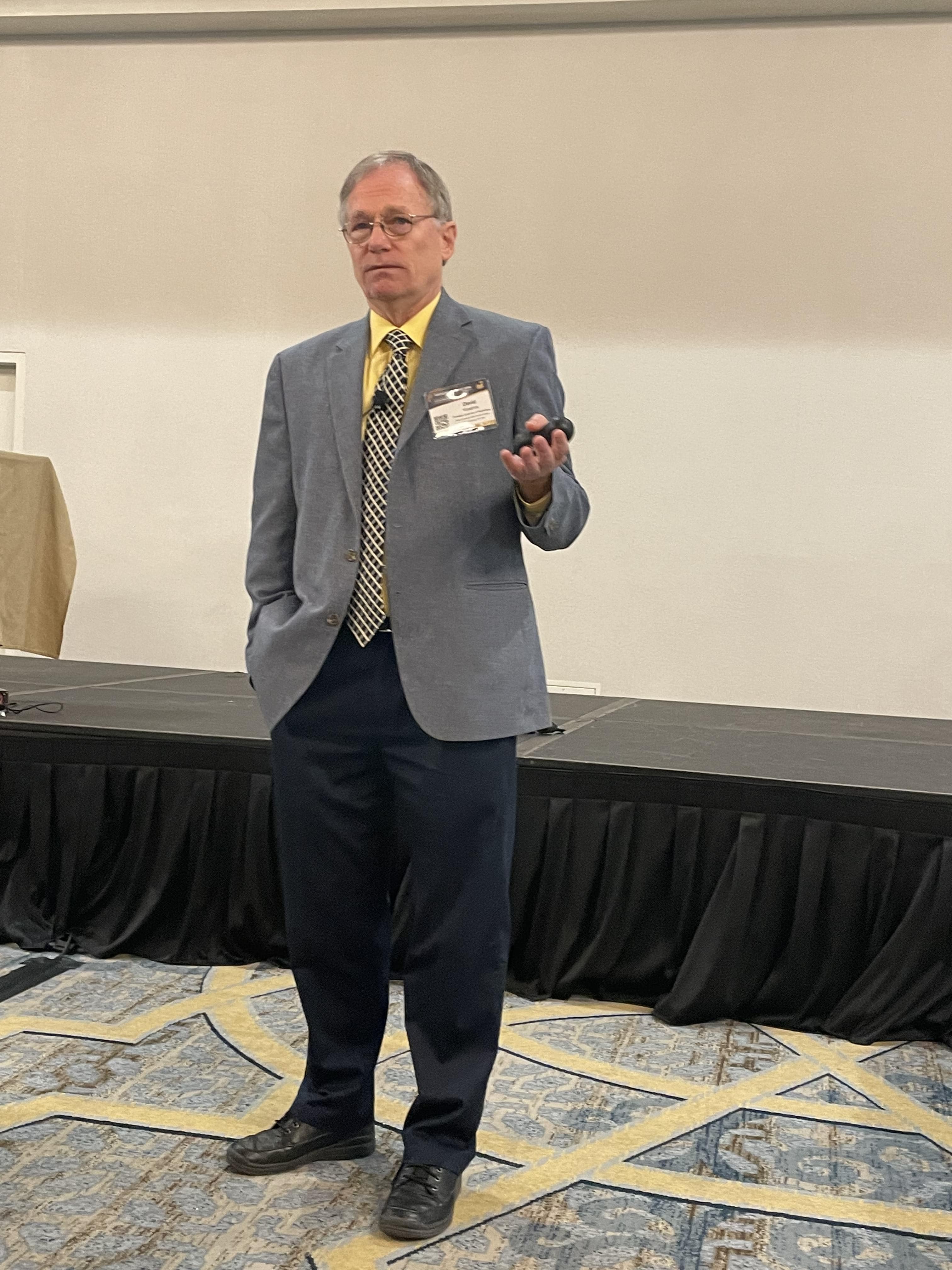
I devoured one of David Kilpatrick’s books a few months ago when studying for a college assignment. He is an absolute wealth of knowledge, and is passionate about sharing what he has learned.
David identified the wide gap between research and practice. Reading research does not tell us what to do in the classroom, but it can provide foundational knowledge for teachers that can improve our practice. When we understand how reading works, we can identify the skills needed, and apply effective teaching strategies.
Dyslexia is a core word-level reading difficulty, despite sufficient effort and quality instruction. The ‘universal’ cause of dyslexia is a deficit in phonological processing.
“All skilled readers have the same basic word-level skills.”
David challenged the idea that children learn to read in different ways. We can teach in different ways, but there is only one way to learn to read proficiently. This is an important distinction, and really worth thinking about. Regardless of how they are taught, skilled readers can decode unfamiliar words due to their phonemic proficiency and letter-sound knowledge. Both are essential.
David packed a lot into his talk, and he could have kept talking! I contacted him afterwards and he has been very generous with his time. He was come under some fire in the academic world of late, which I feel has been unwarranted. The conference ended on a high note for me, with lots of nuggets of information to think about in relation to my impending research project.
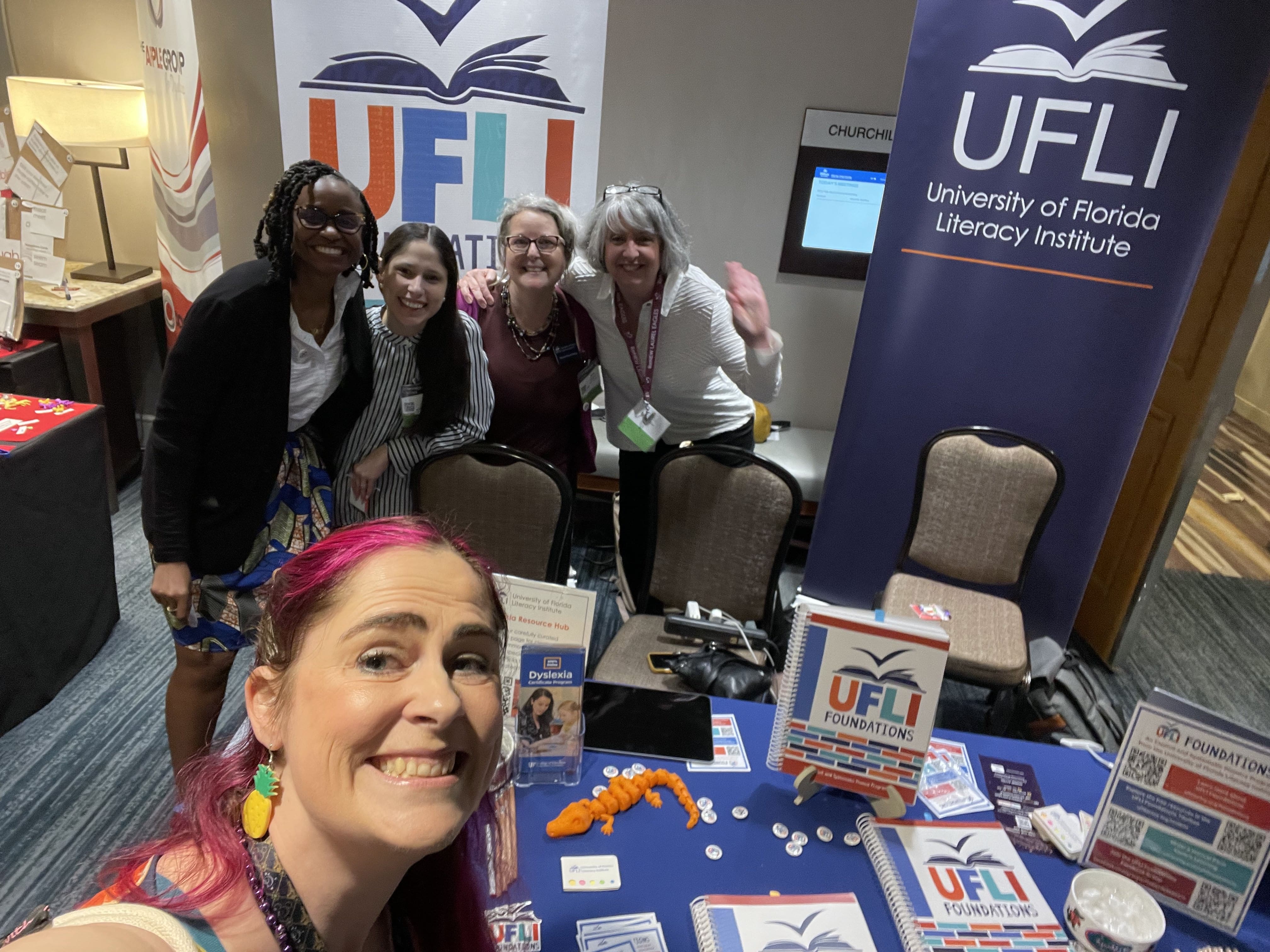
Was it worth it?
In a word, yes. I thoroughly enjoyed every minute of the conference, and my adventures around New Orleans. What a fantastic city! I will definitely return. Location aside, the conference lived up to my expectations, and then some. Every speaker that I got to see was excellent. They were all also more than happy to talk to attendees (and pose for selfies, of course), with many giving out their contact details freely. I also got to talk to fellow attendees and lots of exhibitors. This was a huge opportunity for me to connect with people who may be able to help me with my research.
How much did it cost?
I won’t lie, it wasn’t cheap. Here’s the low-down:
· Conference Registration: $795 (Get $100 off if you sign up early)
· Loews Hotel (conference rate): $230 per night
· Flights: Approximately €700. (There’s no direct flights from Dublin to NOLA. We flew via Boston with Aer Lingus and Jet Blue)
